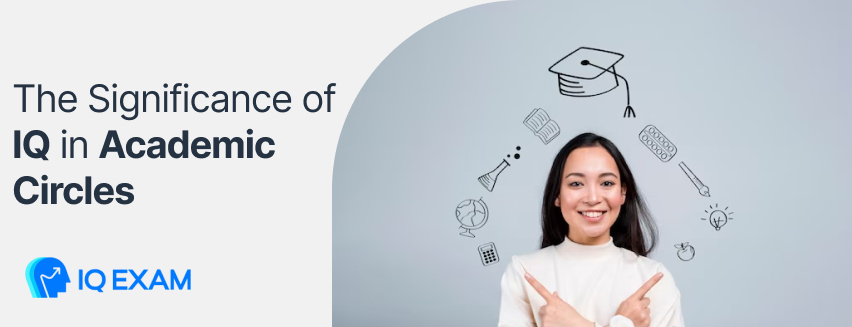
Do Ph.D. students have higher IQs? Do you need a minimum IQ to become a Ph.D. student?
Well, yes and no! We know that could confuse you, but although there is a minimum IQ in Ph.D. students, it’s only a number and doesn’t indicate anything.
It’s not even stable. It varies in different countries, among other societies, and even in different schools.
So, becoming an academic doesn’t really count as a necessity! There are tons of other qualifications and skills, though, that you must have to start a Ph.D.
If you want to qualify as a Ph.D. student, you must take steps toward building these skills and developing yourself. We bet you’d like to know more!
Today, we’re about to delve into the depths of intelligence within the academic world.
But is intelligence synonymous with IQ?
Let’s find out!
The Significance of IQ in Academic Circles

Academia has long regarded IQ as a sign of superior intellectual ability. IQ, or Intelligence Quotient, measures cognition and is mainly known to be connected to success in academia.
However, does a high IQ ensure success in pursuing a Ph.D.?
Demystifying IQ and Ph.D. Success
The relationship between having a high IQ and obtaining a Ph.D. is more complex than one may think.
Although a high IQ can provide benefits, it is not the only factor that drives individuals toward achieving their doctoral aspirations.
Pursuing a Ph.D. requires traits beyond intelligence, such as commitment, enthusiasm, analytical skills, and perseverance.
Can You Attain a Ph.D. with an Average IQ?
Absolutely, yes!
The journey to a Ph.D. is for more than just those with exceptionally high IQ scores. Aiming for a Ph.D. with an average IQ is entirely possible and more common than you might think.
Research has shown that the average Ph.D. student IQ in the USA is 124 for math students and 115-120 for medicines, which shows that it really depends on your field of study.
You’re more likely to become a successful Ph.D. candidate if you have the required characteristics, hard skills, and soft skills than an individual with a 140 IQ who can’t collaborate or isn’t curious enough.
Beyond IQ: Traits that Shape Ph.D. Achievers

Although IQ plays a role, becoming a successful Ph.D. candidate is much more complex. Numerous traits come together to create the conditions for academic success. Let’s look beyond IQ scores and examine the qualities that shape individuals into accomplished Ph.D. achievers.
Characteristics of Successful Ph.D. Candidates
The Curiosity that Knows No Bounds
In academia, Ph.D. students are guided by curiosity. Those who succeed have an insatiable thirst for knowledge, constantly questioning and seeking new avenues of understanding.
This genuine fascination drives them to explore uncharted territories and contribute innovative insights to their field.
Resilience
The journey toward obtaining a Ph.D. is full of obstacles and setbacks.
You have to fight with patience and never let anything disappoint you. Hitting hard rocks at research and instances when you get unmotivated is natural; sobbing over them is not!
So, strong Ph.D. students see every setback as an opportunity to improve.
Natural Team Working Spirit
In the interconnected world of academia, you should know how to make connections and keep them!
Successful Ph.D. candidates have good connections and can collaborate well with teams. Research is mostly teamwork, so people with low collaborative skills won’t do any good in this field.
Analytical Brilliance
Successful Ph.D. candidates have analytical minds or developed analytical minds through time!
They excel in facing complex problems and grasping different theories. They also have the skill to analyze data which is crucial for a Ph.D. student.
Passionate For of Knowledge
Exceptional Ph.D. candidates love Ph.D. studying and the challenges that come with it!
They have a passion for learning, and they believe it won’t end with Ph.D. and it’s a lifelong path. This power helps them make meaningful contributions and never get tired.
Required Hard Skills for Ph.D. Candidates

Embarking on the path to a Ph.D.? You’ll need a toolbox of hard skills that enables you to navigate the complexities of your chosen field.
Beyond intellectual abilities, specific skills play a pivotal role in conducting research, analyzing data, and contributing substantively to academia.
Skill 1: Research Methodology Proficiency
Mastering various research methodologies is a win for any aspiring Ph.D. candidate.
The ability to choose, apply, and adapt research methods is crucial from qualitative to quantitative approaches.
Proficiency in designing experiments, surveys, interviews, and other data collection methods empowers candidates to extract meaningful insights from their studies.
Skill 2: Data Analysis and Interpretation
Data isn’t merely numbers; it’s a goldmine of information waiting to be unearthed!
Adeptness in data analysis tools and techniques, whether statistical software, coding languages, or data visualization tools, equip candidates to unravel trends, correlations, and patterns.
The art of interpreting data transforms raw numbers into actionable knowledge.
Skill 3: Literature Review and Critical Analysis
When conducting research, it is important to examine existing studies to establish a strong basis for innovative contributions.
Successful Ph.D. candidates are skilled in conducting comprehensive literature reviews, identifying research gaps, and critically evaluating previous work.
Such abilities equip them to generate new research that builds on existing knowledge while presenting unique viewpoints.
Skill 4: Effective Communication
Effective communication of research findings is crucial!
Candidates must be able to express complex ideas in a clear and concise manner, whether through written work, presentations, or discussions.
Mastery of academic writing conventions and presentation techniques helps ensure that their research is well-received by fellow scholars and a wider audience.
Skill 5: Time and Project Management
Research projects can span years, demanding exceptional project management skills.
Balancing experiments, data collection, analysis, and writing necessitate impeccable time management.
The project management skill ensures that candidates stay organized, meet deadlines, and maintain steady progress toward their Ph.D. goals.
Required Soft Skills for Ph.D. Candidates

Becoming a successful Ph.D. candidate demands more than just technical prowess!
Soft skills, the intangible qualities that shape interactions and attitudes, are equally indispensable.
Let’s unravel the key soft skills that pave the way for success in the world of academia.
Skill 1: Adaptability and Resilience
The academic field is a dynamic terrain filled with challenges and unexpected twists. Ph.D. candidates who exhibit adaptability and resilience weather setbacks with grace. The ability to adjust research strategies, rethink hypotheses, and bounce back from disappointments is vital on the path to a Ph.D..
Skill 2: Collaboration and Teamwork
While academia often is thought of with images of solitary research, collaboration is at its heart. Actually, science is teamwork!
The skill to collaborate with peers, mentors, and interdisciplinary experts enhances research outcomes.
A willingness to listen, exchange ideas, and contribute to collective knowledge fosters a vibrant academic community.
Skill 3: Critical Thinking and Problem-Solving
This is a researcher’s most important skill: to look at everything from a critical point of view and question everything to create new things.
Successful Ph.D. candidates dissect problems from multiple angles, challenging assumptions and devising innovative solutions.
This skill enhances the quality of research, enabling candidates to tackle complex issues with ingenuity.
Skill 5: Time Management and Organization
The demanding nature of a Ph.D. requires impeccable time management. Juggling research, coursework, and personal life necessitates organizational finesse. Successful candidates strike a balance, ensuring efficient allocation of time while maintaining a sense of order.
Not Every Ph.D. Holder Boasts a High IQ
Are Ph.D. students as intelligent as you think?
Contrary to popular belief, the world of Ph.D. holders is not exclusively reserved for those with sky-high IQ scores.
Stories about individuals with average IQ scores making remarkable contributions to their fields are what you hear more often.
This disproves the idea that only individuals with extraordinary intelligence can pursue academic success.
What IQ Scores Tell Us
IQ scores only show a small part of a person’s abilities and don’t reveal their creativity, determination, or passion. They are just one aspect of a Ph.D. candidate’s intellect and usually differ at different times of our lives.
So, with an IQ of 85 to 115, which is the average IQ, you can easily start the path to a Ph.D. student and also thrive in it!
Frequently Asked Questions?
How Can I Measure My IQ?
IQ shows the rate of your cognitive abilities in numbers through different standard tests. You can reach them online or via your psychologist.
Does a high IQ help Ph.D. success?
A high IQ helps you in graduate school to some extent, but being successful requires many other qualities. You need to be determined, creative, and passionate and have the advantage of a high IQ.
Can I excel in Ph.D. research with an average IQ?
Of course! IQ scores aren’t the only indicators of your success in graduate school. You can compensate for a lower IQ with curiosity, hard work, and dedication to expanding knowledge.
What role does determination play in Ph.D. achievement?
Determination is a key ingredient in Ph.D. success. The pursuit of a Ph.D. demands perseverance, resilience, and the willingness to overcome challenges along the way.
How does the academic environment contribute to success?
Academic environments foster growth through collaboration, mentorship, and exposure to diverse ideas. These interactions enhance research, critical thinking, and overall Ph.D. achievement.
Are there examples of renowned academics with average IQ scores?
Certainly! Many accomplished academics have achieved greatness without extremely high IQ scores. Their success is attributed to a combination of intelligence, hard work, and innovation.
What constitutes ‘intelligence’ beyond IQ?
Intelligence extends beyond IQ and includes emotional intelligence, creativity, adaptability, and problem-solving skills. These qualities contribute to holistic intelligence.
Can IQ be improved over time?
While IQ is relatively stable, cognitive skills can be enhanced through learning, experiences, and brain exercises. Continuous learning can positively impact cognitive abilities.
How can aspiring Ph.D. candidates prepare effectively?
Effective preparation involves setting clear goals, developing strong time management skills, seeking mentorship, and embracing a curious mindset for continuous learning.
How does diverse thinking enrich the academic landscape?
Diverse thinking brings together varied perspectives, experiences, and approaches. This diversity enriches research, fosters innovation, and contributes to a more inclusive academic community.
Conclusion
Still nervous if you fit into a Ph.D. life without an IQ of 140?
Don’t be, then! Most Ph.D. students have an average IQ, and what makes them great candidates is their other hard and soft skills.
Become a master of communication, collaboration, critical thinking, and data analysis, and there you go! You’ll become the best candidate you know only by working hard.
And this is what Ph.D. is all about questioning things, studying them, and working hard to help science. No one with the highest IQ can be successful if they’re not determined or sociable enough!
Remember, pursuing a Ph.D. is like a tapestry woven with threads of intelligence, passion, and perseverance. It’s not just about the numbers on an IQ test but the unique qualities that make you the person you are!
Here’s to the exhilarating journey ahead – cheers to embracing the brilliance of diverse minds and all the joy it brings!
